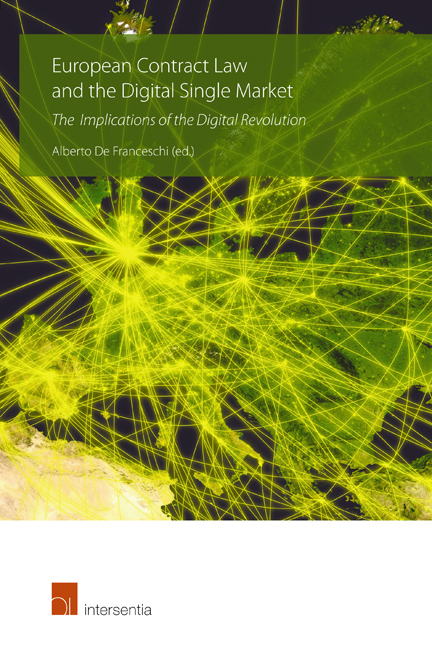Book contents
- Frontmatter
- Preface
- Contents
- List of Authors
- European Contract Law and the Digital Single Market: Current Issues and New Perspectives
- PART I THE IMPACT OF DIGITAL TECHNOLOGY ON PRIVATE LAW RELATIONSHIPS
- Disruptive Technology – Disrupted Law? How the Digital Revolution Affects (Contract) Law
- PART II DATA AS A TRADEABLE COMMODITY AND THE NEW INSTRUMENTS FOR THEIR PROTECTION
- PART III THE LEGISLATIVE INSTRUMENTS FOR A DIGITAL SINGLE MARKET
- PART IV NEW FEATURES OF STANDARD CONTRACTS IN THE DIGITAL MARKET
- PART V ONLINE PLATFORMS IN THE ‘SHARING ECONOMY’
Disruptive Technology – Disrupted Law? How the Digital Revolution Affects (Contract) Law
from PART I - THE IMPACT OF DIGITAL TECHNOLOGY ON PRIVATE LAW RELATIONSHIPS
Published online by Cambridge University Press: 12 December 2017
- Frontmatter
- Preface
- Contents
- List of Authors
- European Contract Law and the Digital Single Market: Current Issues and New Perspectives
- PART I THE IMPACT OF DIGITAL TECHNOLOGY ON PRIVATE LAW RELATIONSHIPS
- Disruptive Technology – Disrupted Law? How the Digital Revolution Affects (Contract) Law
- PART II DATA AS A TRADEABLE COMMODITY AND THE NEW INSTRUMENTS FOR THEIR PROTECTION
- PART III THE LEGISLATIVE INSTRUMENTS FOR A DIGITAL SINGLE MARKET
- PART IV NEW FEATURES OF STANDARD CONTRACTS IN THE DIGITAL MARKET
- PART V ONLINE PLATFORMS IN THE ‘SHARING ECONOMY’
Summary
INTRODUCTION
Much has been said about the effect of disruptive technology on business. In this contribution, an attempt is made to consider, in general terms, the implications of ‘disruptive technology’ for the law, particularly contract law. The particular disruptive technology focused on in this contribution is more of a ‘disruptive development’: the so-called digital revolution, and the new business opportunities and production methods which have emerged from the increasing digitalisation of so many activities, not least by utilising the potential of the Internet combined with smart-technology. These developments undoubtedly pose interesting challenges for contract law, particularly established paradigms forming the basis of many legal rules. This analysis begins by exploring the notion of disruptive technology, before considering the general challenges for, and possible responses by, the law as a result of new developments in technology or business practice. It will then highlight the main novelties of the digital revolution and turn to some of the specific legal issues which the digital revolution seems to create and consider potential legal responses.
The key argument of this contribution is that there is a danger of rushing towards introducing new legal rules in response to new developments without rigorous consideration of the specific issues for both businesses and consumers which are created by things such as the digital revolution. Once these issues have been fully scoped, any legal responses need to be calibrated carefully so as to deal with these issues in a focused manner – there is a risk that, in the rush to provide a legal response, more problems might be created than solved.
DISRUPTIVE TECHNOLOGY
Before considering the impact of the digital revolution on contract law, a few words should be said about the meaning of ‘disruptive technology’, a term used frequently in this context. This notion has gained prominence in the writings of Clayton Christensen, and focuses on the way technological developments can affect the way existing business models operate. In brief, Christensen distinguishes between two types of technological evolution: first, there is ‘sustaining technology’, by which he means technology which is evolving gradually or simply improving established technologies, particularly their performance. In contrast, ‘disruptive technology’ is a new type of technology, which, when first introduced, might be less reliable than established technologies, but will become reliable rapidly.
- Type
- Chapter
- Information
- European Contract Law and the Digital Single MarketThe Implications of the Digital Revolution, pp. 21 - 48Publisher: IntersentiaPrint publication year: 2016
- 4
- Cited by



